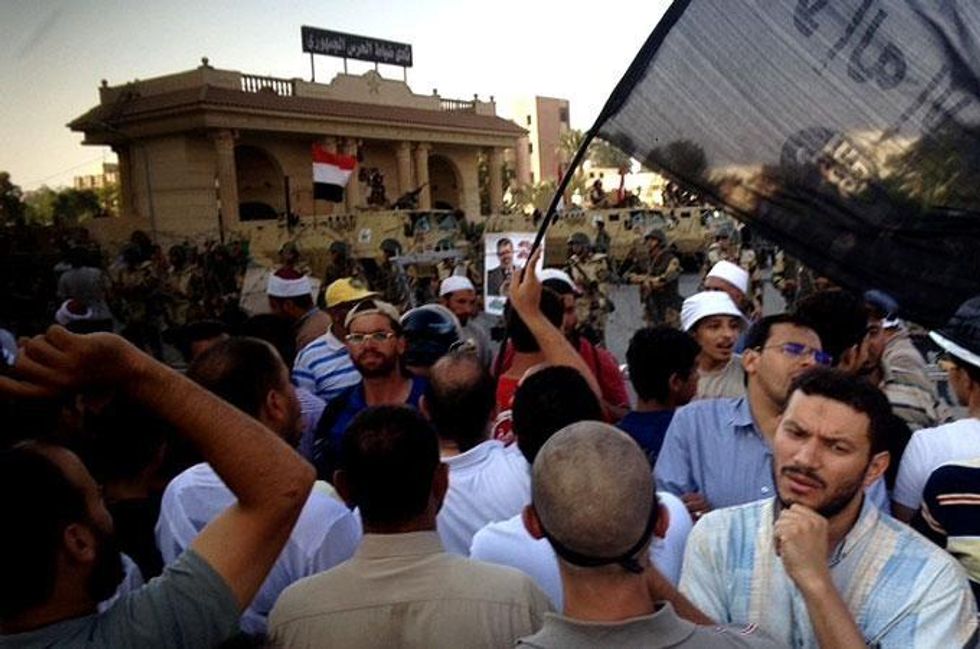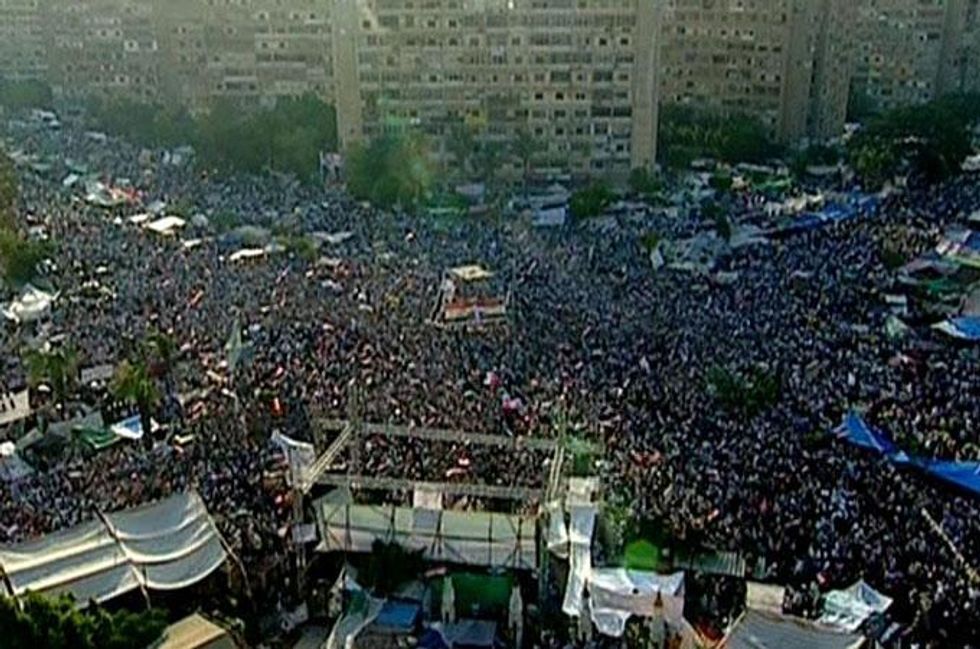

SUBSCRIBE TO OUR FREE NEWSLETTER
Daily news & progressive opinion—funded by the people, not the corporations—delivered straight to your inbox.
5
#000000
#FFFFFF
To donate by check, phone, or other method, see our More Ways to Give page.


Daily news & progressive opinion—funded by the people, not the corporations—delivered straight to your inbox.

Reporting from Cairo University, Al Jazeera's Hoda Abdel Hamid said she had seen crowds moving towards Tahrir Square, carrying Egyptian flags and chanting slogans in favor of the armed forces and against the Muslim Brotherhood.
The youth-led Rebellion Movement which was behind the protests that sparked the ouster of former President Mohammed Morsi have dubbed Sunday's rally in Tahrir the "Dawaran Shubra" march to protect the gains of the revolution.
Meanwhile, a crowd of thousands of Morsi supporters have begun to assemble in Nasr City while approximately 1,000 regime supporters have completely blocked Salah Salem, the main artery that connects the city to the airport, reports Al Jazeera's Matthew Cassel.
On Saturday, the interim president Adly Mansour attempted to appoint former UN nuclear watchdog chief and Egyptian opposition leader Mohamed Elbaradei as his prime minister. However, the process was suspended when the ultra-fundamentalist Salafi Nur Party objected on the basis that he is 'too secular.'

The pro-Morsi protesters have an obvious message, but it may be less clear what their victorious opponents are still in the streets for.
In essence, it's to ensure their goals are met. In the short term, that means the appointment as prime minister of Mohamed ElBaradei, the former UN diplomat turned liberal figurehead, whose elevation to higher office was stalled by the Salafi Nour party.
Mohamed Khamis, a leading Tamarod organiser, known to activists as 'the General', explains:
"Mohamed ElBaradei is our choice for prime minister - why should we change our plans just because one group, the Nour party, says they don't want him? This is unbelievable, especially after so many people went on the streets this week. The citizens are asking for Baradei. Why should we change plans just for a small group."
Khamis says that activists have learnt their lesson from 2011, when they left Tahrir too soon to achieve meaningful systemic change following the decapitation of Mubarak.
"There's no way that we can do what we did on 11 February 2013, and think that everything would be paradise. We're not going to leave Tahrir or any other place until we achieve the goals of the revolution."
Updates on twitter detail the unfolding situation in Cairo:
_____________________
Dear Common Dreams reader, The U.S. is on a fast track to authoritarianism like nothing I've ever seen. Meanwhile, corporate news outlets are utterly capitulating to Trump, twisting their coverage to avoid drawing his ire while lining up to stuff cash in his pockets. That's why I believe that Common Dreams is doing the best and most consequential reporting that we've ever done. Our small but mighty team is a progressive reporting powerhouse, covering the news every day that the corporate media never will. Our mission has always been simple: To inform. To inspire. And to ignite change for the common good. Now here's the key piece that I want all our readers to understand: None of this would be possible without your financial support. That's not just some fundraising cliche. It's the absolute and literal truth. We don't accept corporate advertising and never will. We don't have a paywall because we don't think people should be blocked from critical news based on their ability to pay. Everything we do is funded by the donations of readers like you. Will you donate now to help power the nonprofit, independent reporting of Common Dreams? Thank you for being a vital member of our community. Together, we can keep independent journalism alive when it’s needed most. - Craig Brown, Co-founder |

Reporting from Cairo University, Al Jazeera's Hoda Abdel Hamid said she had seen crowds moving towards Tahrir Square, carrying Egyptian flags and chanting slogans in favor of the armed forces and against the Muslim Brotherhood.
The youth-led Rebellion Movement which was behind the protests that sparked the ouster of former President Mohammed Morsi have dubbed Sunday's rally in Tahrir the "Dawaran Shubra" march to protect the gains of the revolution.
Meanwhile, a crowd of thousands of Morsi supporters have begun to assemble in Nasr City while approximately 1,000 regime supporters have completely blocked Salah Salem, the main artery that connects the city to the airport, reports Al Jazeera's Matthew Cassel.
On Saturday, the interim president Adly Mansour attempted to appoint former UN nuclear watchdog chief and Egyptian opposition leader Mohamed Elbaradei as his prime minister. However, the process was suspended when the ultra-fundamentalist Salafi Nur Party objected on the basis that he is 'too secular.'

The pro-Morsi protesters have an obvious message, but it may be less clear what their victorious opponents are still in the streets for.
In essence, it's to ensure their goals are met. In the short term, that means the appointment as prime minister of Mohamed ElBaradei, the former UN diplomat turned liberal figurehead, whose elevation to higher office was stalled by the Salafi Nour party.
Mohamed Khamis, a leading Tamarod organiser, known to activists as 'the General', explains:
"Mohamed ElBaradei is our choice for prime minister - why should we change our plans just because one group, the Nour party, says they don't want him? This is unbelievable, especially after so many people went on the streets this week. The citizens are asking for Baradei. Why should we change plans just for a small group."
Khamis says that activists have learnt their lesson from 2011, when they left Tahrir too soon to achieve meaningful systemic change following the decapitation of Mubarak.
"There's no way that we can do what we did on 11 February 2013, and think that everything would be paradise. We're not going to leave Tahrir or any other place until we achieve the goals of the revolution."
Updates on twitter detail the unfolding situation in Cairo:
_____________________

Reporting from Cairo University, Al Jazeera's Hoda Abdel Hamid said she had seen crowds moving towards Tahrir Square, carrying Egyptian flags and chanting slogans in favor of the armed forces and against the Muslim Brotherhood.
The youth-led Rebellion Movement which was behind the protests that sparked the ouster of former President Mohammed Morsi have dubbed Sunday's rally in Tahrir the "Dawaran Shubra" march to protect the gains of the revolution.
Meanwhile, a crowd of thousands of Morsi supporters have begun to assemble in Nasr City while approximately 1,000 regime supporters have completely blocked Salah Salem, the main artery that connects the city to the airport, reports Al Jazeera's Matthew Cassel.
On Saturday, the interim president Adly Mansour attempted to appoint former UN nuclear watchdog chief and Egyptian opposition leader Mohamed Elbaradei as his prime minister. However, the process was suspended when the ultra-fundamentalist Salafi Nur Party objected on the basis that he is 'too secular.'

The pro-Morsi protesters have an obvious message, but it may be less clear what their victorious opponents are still in the streets for.
In essence, it's to ensure their goals are met. In the short term, that means the appointment as prime minister of Mohamed ElBaradei, the former UN diplomat turned liberal figurehead, whose elevation to higher office was stalled by the Salafi Nour party.
Mohamed Khamis, a leading Tamarod organiser, known to activists as 'the General', explains:
"Mohamed ElBaradei is our choice for prime minister - why should we change our plans just because one group, the Nour party, says they don't want him? This is unbelievable, especially after so many people went on the streets this week. The citizens are asking for Baradei. Why should we change plans just for a small group."
Khamis says that activists have learnt their lesson from 2011, when they left Tahrir too soon to achieve meaningful systemic change following the decapitation of Mubarak.
"There's no way that we can do what we did on 11 February 2013, and think that everything would be paradise. We're not going to leave Tahrir or any other place until we achieve the goals of the revolution."
Updates on twitter detail the unfolding situation in Cairo:
_____________________